- Home
- Jane Arbor
Sandflower Page 7
Sandflower Read online
Page 7
Chris (“Christopher Herriot Ramsay Ian Soper—d’you wonder I’m just Chris?”) was blue-eyed and plump, and was modest only where his job was concerned. That, Liz found by questioning him, took him out into the desert on a radius of a hundred kilometers and more for days and nights on end. But, making little of the rigors of it, he explained everything else to her in the most patient detail, and they got on famously together.
He showed her the double-walled cabins the men shared in twos, each with its gaudy front door and usually a saucy name; the cinema; the great pumps that drew soft warm water from the heart of the Sahara for use in the kitchens and showers; the throbbing generators making electricity and the big mess hall like the dining salon of a liner.
But when it came to visiting the bore itself, Chris surveyed his companion’s crisp green linen outfit doubtfully.
“I say, did you bring any overalls or kit of that sort with you?”
“No, why?”
Chris grimaced. “Mud,” he said. “Mud and oil. It’s everywhere where you’ll want to have a close look. You can’t escape it, and the engineers who live more or less in a sea of it have to go booted like seven-leaguers. However,” he measured her with his eye, “we’re about the same height, you and I, and though you’ll probably swim in them, I’ve got some shrunken battlerompers that at least would cover you. Boots, too. Not mine, though—my cabin mate’s, a chap with small feet who is on leave in Tasghala at the moment. Shall I go and fetch them, or will you come along to the cabin while I dig them out?”
“I’ll come,” offered Liz.
A few minutes later she was equipped to his satisfaction in a white boiler suit over her dress, boots and, final touch, a miner’s helmet on her head. Chris stood back approvingly.
“I wouldn’t have said I could feel homesick,” he said. “But in that rig you’re so like the queen, on her way down a coal mine, that you almost bring it on. What’s more, you are an Elizabeth yourself, aren’t you?”
“Yes. But I’m always called Liz, and I’m sure the Queen wouldn’t be flattered by the comparison. And, oh, dear, I do hope her helmet was a better fit. Mine waggles when I move my head—look!”
Laughing, they emerged from the cabin as a car drove past and stopped outside a cabin farther down the line. The driver had glanced twice in their direction, and when he alighted Liz saw that it was Roger Yate. He lifted a hand in recognition before knocking perfunctorily at the cabin door and going inside.
Chris said unnecessarily, “That was Dr. Yate.”
“Yes.”
“Coming to see Tandy, I suppose. He pulled a cartilage playing cricket the other day, and we don’t rate a full-time M.O. yet. When anyone goes sick, the Chief gets on the blower to the Pere Foucauld. That’s the hospital at Tasghala. But of course you’d know that. And Yate himself?”
“Yes. You know, my father had a bout of malaria just after I arrived, and Dr. Yate attended him.”
“Of course. Great guy, Yate, don’t you think? Doesn’t suffer fools too gladly, though.”
“No, nor knaves.”
Chris laughed on a surprised note. “Knaves? Now what for the love of Mike, would you know about his attitude to knaves?”
Liz amended hastily, “I really meant the people he doesn’t approve of. The sort to whom he’d give the report ‘Could do better,’ if he were a schoolmaster.”
“But don’t tell me you’ve ever been at the receiving end of his disapproval?”
“How would I know what it’s like if I hadn’t?” she parried.
Chris shrugged. “Dunno. Let’s say you know through your powerful intuition. For I won’t believe he really disapproves of you. Stands to sense no one could. At least no male—”
The compliment was so boyishly naive that, even on their short acquaintance, she couldn’t resent it. Chris was quite a pet, she decided. And—now what was that rather nice word for a soothing ointment? Balm—Yes, Chris Soper’s friendly admiration was balm for that odd thrust of pain in her heart that had more to do with Roger Yate’s opinion of her than she cared to own.
Chris was right. At the bore there was thick, churning mud everywhere, and the men at work grinned at her through masks of it. Chris told her they had “found” at three soundings up to date, and oil was being shipped to the coast in increasing quantities every week. She watched, fascinated, while, on a fourth bore, the enormous drill, which had outworn its purpose, was changed for a new one. It was the heaviest of tasks for three men, and when it was done—“Three thousand meters down so far, and maybe a thousand more before we ‘find,’ ” said Chris. “Continuous night-and-day drilling, at that. D’you wonder we all look forward to our leave when it comes around?”
“I certainly don’t,” Liz told him. “When is your next leave, by the way?”
“Begins on Friday, thanks be. I’m coming in to Tasghala, to the hotel. I say—” he hesitated “—could we make a date for one evening while I’m there?”
“I’d like that,” she said. “And I wonder if you’d come to a bit of a party dada and I are giving?” And she explained about the housewarming for the bungalow, an invitation that he accepted eagerly.
On their way back Liz asked, “Do you spend all your leaves in Tasghala? Or do you go to England for your annual one?”
“No, not to England. For my last one I hopped over to the Riviera and spent it there.”
“You said just now you weren’t homesick at all for England. Aren’t you really?” queried Liz.
“I was at first. Not anymore. I’ve been out here for two years now.”
“I don’t think I am now, either,” Liz admitted. “But aren’t there any people at home that you miss?”
“Of my own—only a grandfather. There was a—but that’s another story.” Chris hesitated. “Is it, though?” he added. “Since you ask, there was a girl I was crackers about. But it was all over before I left England, so there hasn’t been much point in going back.”
“I’m sorry,” said Liz. “And I didn’t mean to pry.” But she felt that the fragment of experience, so like her own, made a bond with Chris, all the same.
He said, “You weren’t prying. It was just one of those things—not young Jenny’s fault, nor mine, except that I didn’t add up to her people’s idea of a match for her. She was underage, you see. Still is—just. And the last time I went to see her, she wasn’t even there. She had been sent to an uncle’s, and her mother told me, charmingly and cruelly, that with my prospects and no private income, I wasn’t eligible enough, and that we weren’t to meet again. There was nothing I could do. I didn’t have Jenny’s address, and I was already booked to come out here. I told myself she would find a way of writing, if she cared. But she didn’t and she hasn’t in all of two years, though she must have known she could reach me through Pan-Sahara Oil.”
“Perhaps they forbade her to write to you, too,” suggested Liz.
“Maybe. She was an obedient child, though I hoped she wasn’t all that obedient. But a lot of water flows under the bridges in two years, and now I don’t watch for the incoming mail as I did. As I said—it’s just one of those things.”
Liz said again, “I’m sorry. That you’ll probably never know why, I mean.”
From there it seemed easy and only friendly to tell him about Robin and Marta Gethin, which she did with such detachment that it seemed like another girl’s story, rather than her own.
At the end Chris said simply, “Thanks—Liz. In a way, that makes two of us—who are still heartwhole, I mean.” Somehow, agreeing with him consoled her for the silly, unrealized, hope that when they reached the line of cabins, Roger Yate’s car would still be there.
On the evening of the housewarming Chris came over early from the hotel and proved a tower of strength in the final arrangements.
He brought with him a pile of the latest dance records from his own collection, and then went in the Land Rover to fetch Janine’s stereo, borrowed for the occasion. Liz, still in slacks and shir
t, watched him go, and then did a last check around before going to bath and change.
She was going to wear daffodil-yellow mousseline—a short dress with the merest suggestion of a tulip curve to the hem, and caught in at its high waistline by a draped cummerbund of Chinese blue that tied in a huge bow at the back.
After those sturdy but necessary desert pattens worn with no stockings, it was exciting to roll on spiderweb nylons and to strap feet—oh, dear, rather broad feet—into matching sandals with absurd stiletto heels. Contrary to her fears, there was an excellent hairdresser in Tasghala, an engineer’s wife who had been trained in an exclusive West End salon. So Liz had kept her petal cut to her satisfaction, and tonight, after yesterdays’ shampoo and set, it fell to her vigorous brushing exactly as she could have wished.
When she was ready, Liz could not resist going up to the roof once more to look around. There would be no moon, and the roof garden had been rigged for a circuit of soft lights that would not dim the stars. And though it was only early evening yet, she was delighted with the effect before she switched it off and went down the ladder again.
Later she did not know how she came to miss her footing on the last rung but one—whether she had caught her heel or, in the half-light, misjudged the distance from the ground. In the actual moment she was only conscious of landing with an awkward jump and being forced to cling to the ladder’s upright with a sickening pain shooting through her left ankle.
To save herself from crying out she addressed the ladder fiercely, “Just as if I hadn’t climbed you enough times by now—” But she still had to use its bottom rung as a seat while she ran exploratory fingers over her ankle.
It was puffed, but the first stab of pain had eased to a dull ache, and she calculated that if she could give it a cold pack before Andrew, on official business at the borj, came in, or Chris returned with the radiogram, she need not tell anyone. If she admitted to the mishap, dada would fuss, and she would not submit to hobbling about bandaged, or sitting like a granny all the evening!
To her relief, the cold pack did wonders, and with care she was walking almost normally when her father came in. Beth—in a white princess dress that accentuated her fairylike grace—came back with Chris; Janine would drive herself over later. Then their guests began to arrive and, with the party getting into its swing, Liz gave scarcely another thought to her ankle.
The idea of the roof garden was admired by everyone. This pleased her immensely until she heard Beth explaining artlessly to somebody that it was she who persuaded Liz to keep its colors soft and its lighting subdued. Beth hadn’t had any say in the design of the roof garden! But Liz was too happy and busy in her roll of hostess to resent Beth for long. At least it was her party—hers and dada’s—and with people apparently enjoying it to the utmost, Beth wasn’t going to spoil it for her.
There was a buffet in the living room; dancing on the veranda and on the roof. People who wanted privacy could stroll away in the shadow of the ethel trees and acacias in the hotel grounds, and Monsieur Simon had given over a room in the hotel as an overflow. But mostly people grouped and regrouped, talking, dancing or just looking on, in and around the bungalow.
For Liz, between hilarious interludes at the buffet and dances—her ankle slightly tender but giving no trouble—there was a moment when she came upon Andrew and Beth talking to Roger Yate, who had not long arrived.
He fetched a chair for her and as he bent to offer the flame of his lighter to her cigarette, his lifted brows had an air of inquiry. They had not met face to face since the incident on the roof, and Liz wondered if his mute question had been whether she had yet recovered from her “tizzy of temper.”
As she sat down beside Andrew he pulled at the lobe of her ear affectionately. “Burning, eh? We were just talking about you, Liz.”
“About me?”
“Yes, I was saying that I was in doubt about what you’d find to occupy you, now you’ve finished doing your worst by this place.”
“Worst, dada?” she echoed, unnecessarily on guard.
“Best, you goose! You’ve transformed it. But anyway, Yate here has offered to keep your idle hands out of mischief. If you are interested, that is.”
Liz looked from one man to the other. “Doing what?” she asked of Andrew.
“Elementary nursing aid at the Pere Foucauld, as a matter of fact.” It was Roger Yate answering her question. “If you cared to give one or two hours on a few mornings a week, Nursing Sister Superior would be grateful, I know.”
“But should I be of any use? What should I have to do?”
“Anything that’s asked of you, short of actual skilled nursing. Checking bandages, marking linen, weighing diets, perhaps even setting up dressing trolleys if that St. John’s certificate of yours is equal to it—”
So he had remembered that! Though she knew it was absurd she felt rather pleased. Liz said, “I’d like to help. But I haven’t really had any practical experience, you know.”
“All the same, I daresay your standards of hygiene could give points to some of the orderlies we have to rely on at present. I’ve seen a dressing dropped on the floor, dusted off and offered in bland innocence to a surgeon before now.” Roger turned to Andrew. “Okay with you? May she try it?”
“Yes, of course, if she wants to.” As Andrew rose and strolled away to speak to someone else, Beth interposed on a note of reproach, “You’ve never asked me to help at the hospital, Roger. Am I too silly for it, or something?”
He looked at her indulgently. “You aren’t the proud owner of a St. John’s certificate. And maybe I judged you weren’t the type,” he teased.
“And Liz is the type? Oh—” Beth broke off and fluttered her eyelashes at him. “I suppose, by that, you mean much the same as you did the other day?”
“Probably, yes.”
Liz looked straight at Beth. “Ought my ears to have burned then, too?” she asked.
“Yes in a way. I said that it was odd, wasn’t it, our having the same name. But Roger said it didn’t signify anything and couldn’t confuse anyone. Because I was a ‘Beth,’ just as you were a ‘Liz,’ and that was all there was to it.”
Liz commented a little crossly, “It sounds a bit obscure to me. What’s the difference between a ‘Beth’ and a ‘Liz,’ anyway?”
“Well, he didn’t explain your part of it. Did you?” Beth referred to Roger. “But you said, if you remember, that ‘Beth’ suggested a rather appealing, defenceless person. So I suppose that does make Liz just the opposite—terribly self-reliant and all the rather—well, hearty things that I’m not? And if you did mean that, I thought it might explain why you should think she would be better than me at helping at the Pere Foucauld.”
Liz turned to Roger. “Do you think I’m hearty?” she asked.
His glance met hers as levelly. “Beth’s choice of word, not mine,” he countered. “I could think of others, though they mightn’t please you any more than hearty. Come to that, what’s so wrong with it? For instance, opinions may differ as to whether Elizabeth the First was uppish or vital; an autocrat, a designing female, or a poppet. It depends on one’s point of view. But hearty she certainly was. And another thing I’ve always suspected,” he concluded coolly, “is that to her very best friends she was ‘Liz,’ and liked it!”
Both girls laughed—Beth a little forcedly, Liz with surprised gratification. Then Beth claimed, “Well, I’m still content to keep the ‘Beth’ end. Besides, Roger—” her tone arching “—it’s not terribly fair of you to compare Liz to Elizabeth the First, you know!”
“And why not? She ought to be flattered.”
“But, no!” Beth beat lightly on his forearm with tiny fists. “Queen Elizabeth never married, you horrible man! Why, it amounts to condemning Liz to spinsterhood already!”
“Nothing of the sort,” he retorted crisply. “In my experience, the Lizes of this world don’t wait to be condemned to anything. Marriage or what have you—they know very well what t
hey want, and mean to drum their heels until they get it. Not that it’s so bad a quality, at that. At least they usually arrive, even if they leave everyone else, faint but pursuing, far behind.”
Beth murmured in gentle rebuke, “Now you’re making it worse, by sounding as if you were accusing Liz of being roughshod!” She stood up, held out both hands to him. “Come and dance, before she positively hates us. Anyway, we’re a bit de trop, because in a moment Chris Soper is going to pounce on her for another dance. He’s a conquest of hers, did you know? He’s been hovering and hankering all the evening, and they only met just the other day. So maybe you’re right, and Liz does know how to get what she wants. I mean, I’ve known Chris for ages, and he’s never thrown a second glance at poor me!”
And to the haunting lilt of “I Could Have Danced All Night” she drifted into Roger Yate’s arms, leaving Liz torn between feeling battered and curiously, perversely happy. On the face of it, Beth—so very smoothly—had succeeded in belittling her. But somehow she felt Roger had been on her side for once; that in that three-sided exchange about her name he had left something unsaid in front of Beth; that, for whatever it was worth, he might say it if they were alone together. And she knew she wanted him to seek the opportunity...
She did not see him again until, a little overwhelmed by the clamor indoors, she slipped around the side of the bungalow to where three steps cut into a rising bank gave onto a back avenue leading from the hotel. It was dark and comparatively quiet there, and she settled on the top step to enjoy a cigarette in the peace and coolness. But she had scarcely inhaled her first puff when another cigarette glowed from the avenue and Roger approached from the direction of the hotel.
“Hello. Alone?” He paused above her.
Hugging her knees, she twisted around in order to look up at him. “Yes. It was a bit much in the house, and the roof is crowded. Do you want to come through?”

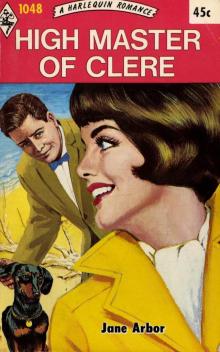 High Master of Clere
High Master of Clere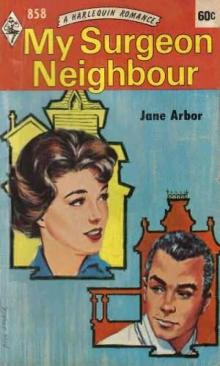 My Surgeon Neighbour
My Surgeon Neighbour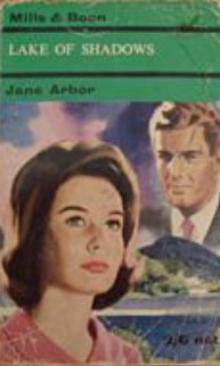 Lake of Shadows
Lake of Shadows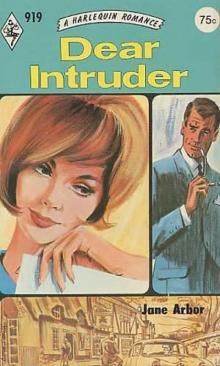 Dear Intruder
Dear Intruder Flash of Emerald
Flash of Emerald Return to Silbersee
Return to Silbersee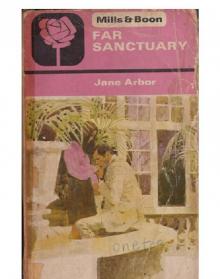 Far Sanctuary
Far Sanctuary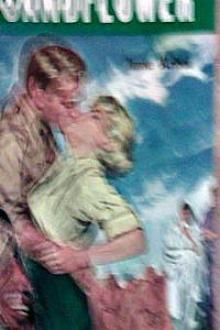 Sandflower
Sandflower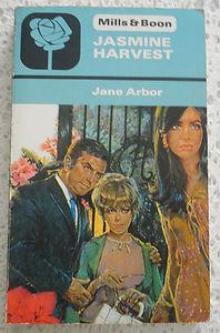 Jasmine Harvest
Jasmine Harvest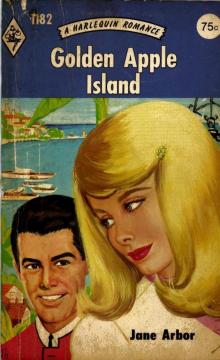 Golden Apple Island
Golden Apple Island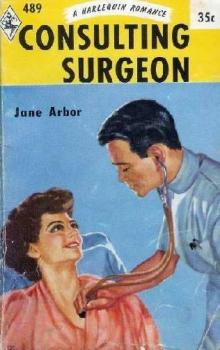 Consulting Surgeon
Consulting Surgeon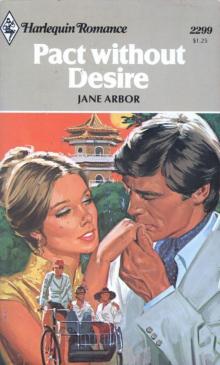 Pact without desire
Pact without desire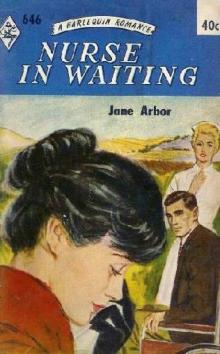 Nurse in Waiting
Nurse in Waiting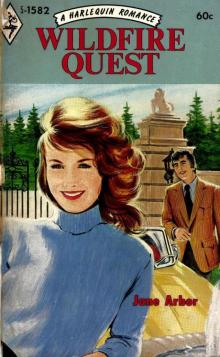 Wildfire Quest
Wildfire Quest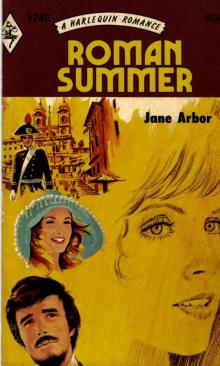 Roman Summer
Roman Summer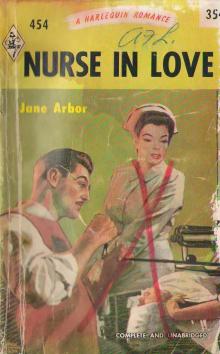 Nurse in Love
Nurse in Love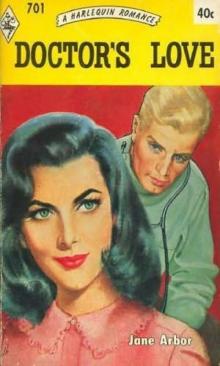 Doctor's Love
Doctor's Love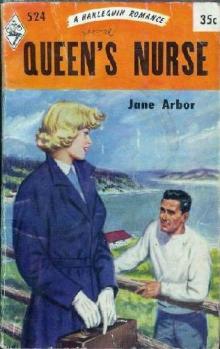 Queen's Nurse
Queen's Nurse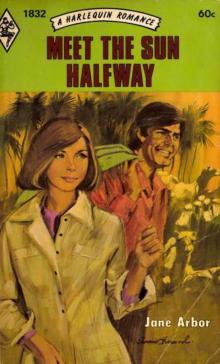 Meet the Sun Halfway
Meet the Sun Halfway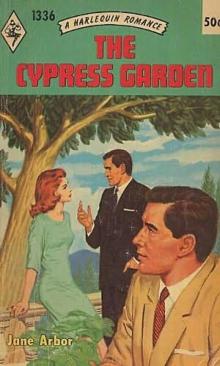 The Cypress Garden
The Cypress Garden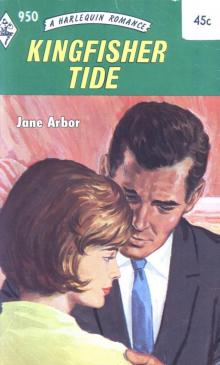 Kingfisher Tide
Kingfisher Tide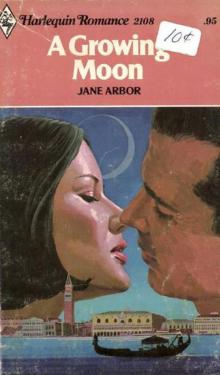 A Growing Moon
A Growing Moon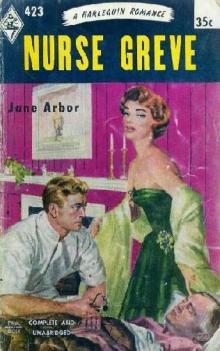 Nurse Greve
Nurse Greve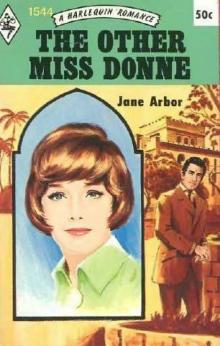 The Other Miss Donne
The Other Miss Donne